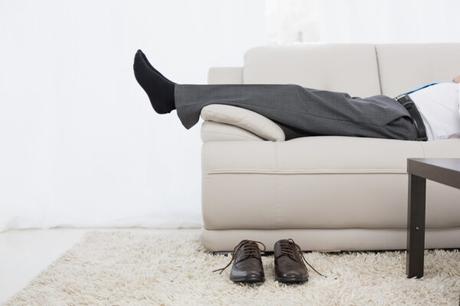Last Updated on by Jeremy
Disclaimers: Living the Dream uses demographic data, email opt-ins, display advertising, and affiliate links to operate this site. Please review our Terms and Conditions for more information. Listed prices and attraction details may have changed since our visit and initial publication.
I overworked myself in 2019. There is no doubt about that.
In my first year of running my online business full-time, I hit things hard in order to increase my online traffic (and therefore income) to offset the day job income that I walked away from. I achieved this goal, but also pushed myself to the breaking point in the process.
I was exhausted (both physically and mentally), acquired a few bad habits, and gained weight all at the same time in order to achieve this "success". By the end of the year, I had to take a moment and reflect on why I was doing what I was doing, and I realized that my goal for quitting my day job was to have more time for me just as much as it was to have more time to work.
So, I put together a 30-day digital detox for January and stuck to it fairly hard. In this one, I wanted to share the results and lessons learned from the experience.
What is a Digital Detox and Why Do One?

A digital detox is about removing yourself from electronics in order to break bad habits, reduce screen time, and establish new habits moving forward.
My goal of pursuing this was simple. In owning my own online business, I found myself being online and "working" almost every waking minute of the day. My work-life balance was, well, non-existent (an especially troubling trend when you've monetized your life). When I had a day job plus the side venture, I was working 80-90 hour weeks. When I quit the day job to do this full-time, I was still pushing 60+ hour weeks all the same and hardly ever turned off.
When I'd go to the gym, I'd think of something I needed to do and would leave early. When I was playing guitar or mandolin, the same. Watching TV or doing a mindless activity? You guessed it, I'd get an idea and go right back to work.
As one of my goals of working for myself was more "me time," the decrease in hours worked was great- but I was still working many more hours than ideal. This resulted in a lot of stress, lack of sleep, drinking more, weight gain, and being a bit of a reclusive at times (okay, that last one I am not that upset about).
To compensate for this, I have decided to make January an annual digital detox month where I focus on a few hobbies, minimize my screen time, and build new habits for the year. As conventional wisdom says it takes about 30 days to create a new habit, and January is generally a slow month all around, it seemed like the perfect time to start on new goals and the digital detox plan was born.
My Ideal Digital Detox Schedule

My idealized digital detox schedule revolves around four hobbies I want to work on for the year. They are going to the gym, learning musical instruments (guitar + mandolin), reading, and learning a new language (Portuguese to coincide with our fall trip).
In the last year, I'd pursue these hobbies (minus languages) for anywhere from 15-30 minutes on most days and, as noted above, would often get distracted by work and quit. For this digital detox, I'm trying to hit a minimum of two hours a day, five days a week, for these goals.
In addition to these, I also wanted to combine this with a food and alcohol cleanse and try to restructure how I eat and minimize my alcohol consumption in an effort to lose weight. I started this before the detox to a degree and lost about 12 lbs, but in order to hit my 25 lb goal for a February beach vacation, I decided to put this in overdrive- partly from more time at the gym, and partly from reducing my overall calorie intake via smaller meals and drinking less (attempting a wine-only month with only a couple cheat days due to a conference).
As such, my idealized schedule for this detox was as follows:
7am to 8am - Wake Up, Coffee, Get ready for the day
8am to 10am - "Work" (basic minimum to keep websites going)
10am to 12pm - Gym
12pm to 1pm - Shower and Lunch
1pm to 3pm - Play Music
3pm to 4:30pm - Sleep
4:30pm to 5:30pm - Dog Park
5:30pm to 6:00pm - Dinner
6:00pm to 8:00pm - Read + Languages
8:00pm to 10pm/11pm - Free time, Movies, TV
The ultimate goal of this schedule was to specifically spend two hours a day at the gym, to only work from 8am to 10am, or to relegate all of my free time at the end of the day to reading or watching movies. The overall goal was to establish patterns of doing some of these activities longer (gym and music) and others less (movies/TV and working) than I was previously used to in hopes of keeping that going for the rest of the year.
While I made every bit of effort force myself to stay at the gym for the entire period, especially at the start of this plan, if I hit exhaustion after an hour or 90 minutes, well, so be it. I just didn't want work or any other activity to be the reason why I left. The same would be true for all of the other activities listed above as well.
If I felt content reading for an hour and playing music for three, that would be fine. And if I slept for 30 minutes or two hours instead of 90 minutes, also fine. I simply wanted the deciding factor for each to be based on my needs for that particular interest over the burning desire of needing to work more as was previously the case.
Likewise, I also wanted it to be a test to see how much my online business can carry itself while being mostly hands-off. Most of our passive income continues regardless of if we are actually working on the business (most of what we do is for future income), but we still have a couple of hours of work a day to keep things going.
So instead of writing 30+ articles per month, I wanted to minimize my work as best as possible. If my business can run off 10 hours a week instead of 60, then it would be more incentive to not work 60 in the future.
So, how'd it all turn out?
Results of a Digital Detox

My first digital detox attempt was a mixed bag, I have to admit.
The first week or so of the month I did a pretty good job keeping to my schedule (minus the dog park bit, the weather was always too bad- just went on regular walks instead). I was working just two hours with a hard stop, reading for about two hours, and the like.
I found that playing music was the biggest challenge at the start, if only because my fingers couldn't keep up for that long period of the time, so I quickly reduced my playing time accordingly. This also happened at the gym where I would hit physical exhaustion between 60-75 minutes of moderately intense working out. I coupled this with walking the dog twice a day and still ended up hitting two hours of "being active" that I would call a win.
In my opinion, these changes were acceptable to the goal as they were based on feedback from my body and not because of a nagging interest in picking up my computer and working more.
Towards the end of the month, I started to struggle with reading more as well if only because my choice of books were intense resources on wine and not easy reading material. I hit a bit of a wall and my hours allocated to this activity dropped- but I plan to start back up with light fiction to offset this moving forward. And as for learning a language, well, I couldn't quite find any apps that worked for me and quickly gave that one up and filled the time up with playing a new video game (I know, I know).
So by the end of the 30 days, my patterns ended up being more like the following on an ideal day:
7am to 8am - Wake Up, Coffee, Get ready for the day
8am to 10am - "Work" (basic minimum to keep websites going)
10am to 12pm - Gym or Walk the Dog
12pm to 1pm - Shower and Lunch
1pm to 2pm - Play Music
2pm to 3:30pm - Sleep
3:30pm to 4:00pm - Walk the Dog
4pm to 5:30pm - Goof off (video games)
5:30pm to 6:00pm - Dinner
6:00pm to 8:00pm - Read (later Goof off)
8:00pm to 10pm/11pm - Movies, TV
Despite somewhat failing at some of my activity goals in the latter half of the day, I'm still impressed with my ability to compartmentalize my work into just two hours a day and increase my activity levels to two hours a day as well.
I got to see first hand that my business really does run itself and somehow made just under $8,000 on the month almost exclusively through passive means from work done in prior months and years (a major win). While I did feel like I needed to work more hours in the day in order to get all my goals finished, I'm hoping that in the coming months this will average out to more like 4-6 hours a day instead of 8-10.
Likewise, I saw a significant improvement in my weight loss goal with the gym (coinciding with a mostly wine-only alcohol month). I lost an additional five pounds and am just shy of 20 pounds lost in the last six or so months with about five to go before hitting my target. I am still not over-the-moon excited to go to the gym every day, but I don't despise it and feel much more refreshed after every workout, so I'll call that a win as well.
Overall, I think one of the biggest pitfalls of putting together a digital detox schedule like this was that I did not have focused enough goals for the month. The ones that succeeded (only working 2 hours a day, losing weight, drinking only wine) did so because I had clear targets in mind. For working it was a maximum hour. For weight loss it was my 25 lb goal. For drinking, it was the wine limitation.
I did not have these in my head for playing music, reading, or learning a language. Simply having a target of "do this activity for two hours" is not enough.
In retrospect, I should have defined them to be much more focused like "master fingerpicking of [x, y, and z] songs on guitar" or "read [a, b, c, d, and e] books in their entirety." When I hit the wall with my second book, I did not have a third readily available to take its place, and the lack of direction further complicated things overall.
Still, I found this experiment to be a success all the same and is something I look forward to attempting again next January in order to re-align myself with my goals for the year. But when I do, I'm going to focus less on the time requirements (outside of the working less goal) and more on a tangible outcome to work towards.
So if you are thinking of putting together a digital detox but find going with a schedule based approach to be a challenge, you may want to consider changing your mindset to be outcome-based.
Have you attempted a month-long digital detox before? What did you do and how did it go? Comment below to share your experiences!
